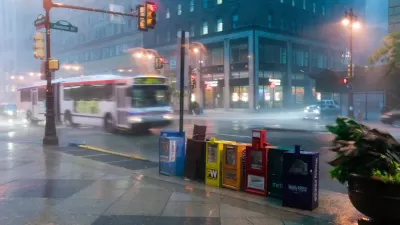A pair of articles pushes back on a recent study that claims public transit use in the United States is reaching record levels.
David King, Michael Manville and Michael Smart pen an op-ed for the Washington Post regarding the recent report by the American Public Transportation Association (APTA) that celebrated a record 10.65 billion transit trips in 2013. (The Washington Post op-ed follows another article by Wendell Cox, who also found flaws in the narrative presented by the APTA about the surge in transit ridership.)
The opinionators make it clear that they support public transportation, “but misguided optimism about transit’s resurgence helps neither transit users nor the larger traveling public.” The crux of their argument: “Many numbers look impressive without denominators, but anyone who examines transit use as a rate — whether as trips per person or share of total travel — will find that transit is a small and stagnant part of the transportation system.” They focus on the deficiencies of the nation’s transit systems, and the negative externalities caused by the dominant mode of driving. “No one should pretend these problems are spontaneously solving themselves because Americans have decided en masse to ride transit instead of driving.”
In a separate article, Eric Jaffe also picks up the pieces of the uncritically exuberant response to the report by focusing on a reason for the continued transportation dominance of cars in the United States: “Incentivizing transit use will only go so far without disincentivizing car use.” Jaffe also reminds advocates not to get caught up in futuristic transit solutions. “Many of the tools to ease the mobility problems facing cities can be found right here in the present.” Moreover, “the practical truth is that good public transit must be in place before metro areas can realistically think about making it more expensive to drive.”
FULL STORY: Use of public transit isn’t surging

Planetizen Federal Action Tracker
A weekly monitor of how Trump’s orders and actions are impacting planners and planning in America.

Restaurant Patios Were a Pandemic Win — Why Were They so Hard to Keep?
Social distancing requirements and changes in travel patterns prompted cities to pilot new uses for street and sidewalk space. Then it got complicated.

Map: Where Senate Republicans Want to Sell Your Public Lands
For public land advocates, the Senate Republicans’ proposal to sell millions of acres of public land in the West is “the biggest fight of their careers.”

Maui's Vacation Rental Debate Turns Ugly
Verbal attacks, misinformation campaigns and fistfights plague a high-stakes debate to convert thousands of vacation rentals into long-term housing.

San Francisco Suspends Traffic Calming Amidst Record Deaths
Citing “a challenging fiscal landscape,” the city will cease the program on the heels of 42 traffic deaths, including 24 pedestrians.

California Homeless Arrests, Citations Spike After Ruling
An investigation reveals that anti-homeless actions increased up to 500% after Grants Pass v. Johnson — even in cities claiming no policy change.
Urban Design for Planners 1: Software Tools
This six-course series explores essential urban design concepts using open source software and equips planners with the tools they need to participate fully in the urban design process.
Planning for Universal Design
Learn the tools for implementing Universal Design in planning regulations.
Heyer Gruel & Associates PA
JM Goldson LLC
Custer County Colorado
City of Camden Redevelopment Agency
City of Astoria
Transportation Research & Education Center (TREC) at Portland State University
Camden Redevelopment Agency
City of Claremont
Municipality of Princeton (NJ)



























